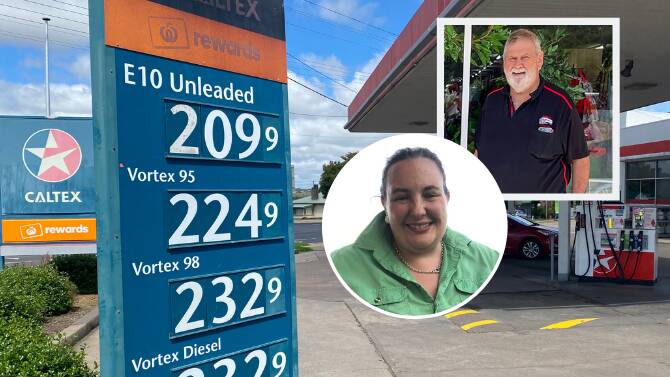
Local businesses have been dealt another blow.
Subscribe now for unlimited access.
$0/
(min cost $0)
or signup to continue reading
As things just started to get back on track post-pandemic, residents are now dealing with skyrocketing fuel prices.
Inverell Freighters are trying to "roll with the punches", however say if prices remain steady at the over-$2 mark or continue to increase, they will have to have a hard think about their long-term operating model.
"At the moment, we are endeavoring to pass this on to our customers as much as we can," owner Keri Brown said.
He said the thoughts that went through his head when he saw the morning's fuel prices would "be unprintable", and the cost was something they had to manage on a daily basis.
"It's impacting us all. Not only fuel, but other inputs into our business as well - like spare parts, imports, everything," he explained.
"It's creating a lot of uncertainty at the moment."
READ MORE:
In the past week, the average wholesale price for petrol went up by 19c/L and for diesel it was a staggering 34c/L.
Ruckus Energy Co founder and chief of operations, Mick Jarvie, said what we were seeing was truly "astounding".
"Normally wholesale prices move a couple of cents in a week," Mr Jarvie said.
Behind the rise, was the Ukranian conflict adding uncertainty to crude oil supplies and speculation into the trading markets, he explained.
"We may have seen the peak of it for now (as crude priced dropped somewhat last Friday), but I think we are in for a rocky ride ahead.
"This is definitely biting into family and business budgets right now, so it's having a major impact. Of course it doesn't compare to what those in Ukraine are going through, but some people will have to limit driving if these kind of prices persist," Mr Jarvie said.
There is a real impact on the workforce.
Samantha Noon, who runs her own training assessment and consulting business based in Goondiwindi, said she was hearing of many people reassessing their current employment.
"Employees are now weighing up whether it is financially feasible for them to continue in their current roles," she said.
"Think about it: if employees have to travel to their workplace it has now become more expensive for them to work there.
"But that's not the only thing. The fuel price hike is also going to drive up grocery and general living costs.
"People are now actively looking for opportunities that are more economically suitable for them and their families. With jobs aplenty at the moment, chances are pretty good. This is a major factor in the 'great resignation' we are hearing about.
"Encouraging your staff to stay working for you during this time is the latest challenge for businesses."
Northern Tableland's MP Adam Marshall has joined calls to the federal government to get rid of the fuel tax, but Mr Brown said he thought increasing their rebate would help ease the burden.
Running a medium sized car over one year, paying 210 cents per litre for unleaded fuel, totals to an annual cost of $6800, with about $1390 of that paid as excise.
"From the beginning of last week to the weekend, I saw prices leap by 40c/L in some cases, and when I saw 230c/L for diesel on Saturday, I couldn't believe it," Mr Marshall said.
He said he'd heard from a local registered nurse, who'd calculated her fuel costs will be about $330 a fortnight and is reducing other costs, such as food, to meet the additional burden.
"The shocking spike in fuel prices over the past week will hit everyone hard and fast and we need the federal government to act without delay... by removing the current fuel excise (tax) of 44.2 cents per litre," he said.
"With the price for unleaded fuel bounding well beyond 220c/L and diesel fuel costs eclipsing that benchmark at 230c/L and beyond, something's got to give."
Our journalists work hard to provide local, up-to-date news to the community. This is how you can access our trusted content:
- Bookmark inverelltimes.com.au
- Make sure you are signed up for our breaking and regular headlines newsletters
- Follow us on Twitter: @inverelltimes
- Follow us on Instagram @inverelltimes
- Follow us on Google News


